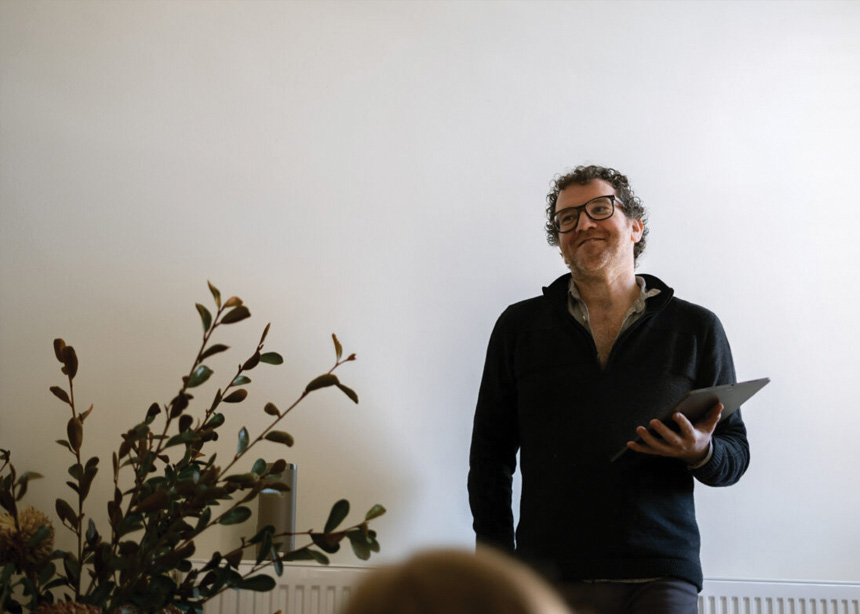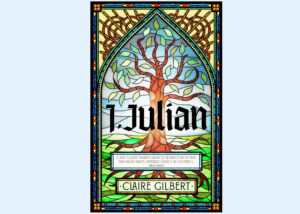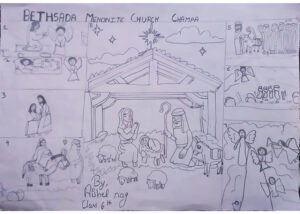Pádraig Ó Tuama is a theologian, poet and the author of several books including the forthcoming Kitchen Hymns (2025) and 44 Poems on Being with Each Other (2025). He is a member and former leader of Corrymeela, Northern Ireland’s oldest peace and reconciliation organization.
He grew up Irish-Catholic near Cork, Ireland. Canadian Mennonite approached Ó Tuama as someone who has brought peacemaking and literature together.
Pádraig Ó Tuama spoke with Susan Fish by telephone on September 4. The following are excerpts of their conversation.
Some people just aren’t into poetry. What do you say to them?
First of all, nobody has to find poetry interesting. I would never try to convince anybody to find an interest in poetry. If it’s not interesting, go to where your interests are. Find things that stimulate your thought.
But we are constantly looking for words that matter.
I was at a Mumford and Sons gig in Belfast a few years ago. Their lyrics are dense and thoughtful, with long sentences and long words. Almost everybody around me was singing all the lyrics back, and no one was stumbling and stuttering. There’s something beautiful about the way memorization occurs most easily when you remember it with tunes, and about having something in your body that you’re singing back. It can be useful to remind people that we’re always learning lyrics: whatever the song on the radio that you love, by the end of hearing it a few times over the course of a week or two, you feel a secret sense of pleasure about the fact that you know all the words and you might even hum it to yourself.
In many ways, poetry is everywhere, whether or not that’s formal.
But often what happens is people are interested in poetry, but they perhaps have not been entirely sure how to be interested in poetry, or maybe they had some examinations in school that they didn’t enjoy doing that have given them a lasting bad taste.
I don’t love all poems, and I don’t love all the poems of the poets that I love.
I want to jump to the connections between poetry and conflict resolution because you have worked in both areas. Where is the overlap for you?
I’m interested in language, and language that’s precise and modest, speaking to what it knows, as well as language that explores mystery. All of those things are true for the experience of conflict as well as in poetry.
Often much can be achieved by realizing we disagree about different things. So much is about modesty of language and leaving space for the blank space, which is to say: can you recall all the things you don’t know?
That’s one of the things that a poem’s presentation on the page [does]. If you wanted to be more economical with ink and paper, you could fill it all up, but the emptiness on the page is a reminder about the fact that all language, spoken and written, is informed by everything we don’t know, everything that perhaps is unsayable. That can be a helpful reminder.
Some say Mennonites tend not to say what they mean out of a desire to keep the peace. You have talked elsewhere about the importance of naming but here you’re also talking about leaving that space for what is unknown. What would you say to people who hope to hold that fragile peace by not naming?
Avoidance of conflict shows up in very subtle ways, and no matter how subtle it is, it usually comes with enormous drawbacks. Of course, there’s obvious situations where somebody might be bereaved, and you decide not to talk about the fact that they parked in the wrong space. But in terms of anything lurking underneath, it’s worthwhile talking about.
Why else are we hearing advertisements for therapy? There’s so much that needs to be said.
I’m not an advocate for just letting it all spill out, because sometimes you can say things that are terrible, things that are impossible to unsay. However, there are ways of saying things you thought you’d never be able to say, and then the other person might go, “I’m so relieved.” It’s worthwhile improving your skills and trying to say something that needs to be said.
Often people in conflict will not present themselves as using an avoidance tactic. It presents as some other reason—it’s the wrong time, or it’s been too long or it’s been too quick.
I think there needs to be the question: what am I holding onto and what do I need to say?
Even if you [say]: I don’t think I’m going to say this to this person, but if I were to say it, what would I say? that at least can help you get in contact with your desire of what you wish to say because that desire is driving you one way or another.
How does the average person do this kind of work?
We’re all doing conflict reconciliation work with ourselves and with whoever else with whom we live. I’m always interested in asking people: what are you already using that’s working?
It can be imagined that the whole idea of conflict resolution is that you don’t have conflict, but of course you do. The point is to have a positive experience of conflict in a way we can come away knowing it was fruitful because we understand what the [other] thinks, what’s negotiable and what’s not negotiable.
Rather than repeating whatever argument you’ve been making with yourself at 6 a.m. in the shower every day and starting up your day with rage in an imagined conversation, you find yourself with the capacity to try to say some of the things you think might be fruitful to ask, as well as to come into contact with what it is you don’t know.
Often the imagined arguments I have are ones where I am giving the showdown, and those are very immature fantasies. They’re satisfying, but ultimately what you’re hoping for in a fruitful conflict resolution is to come away [with awareness of what you] didn’t know. Then when there can be the possibility of people who are open to those experiences coming together, something interesting can happen.
It’s eight years since the decision was made within Mennonite Church Canada for discernment to happen at a congregational level about LGBTQ inclusion. The hope was that it would allow different communities to coexist, but in some places, what ended up happening was that congregations left because they didn’t feel comfortable affiliating with churches that read the Bible differently. You’ve talked about bringing a poem to a mediation to help frame the divisive issues in the room. I’m curious: if you were working with this denomination, is there a poem you would prescribe to help reframe the division?
Not in general, without knowing the people in the argument. For me, it’s about asking multiple questions and then seeing what underlying things occur, and then from that, asking questions about whether there’s a poem that speaks to that condition.
The general comments that I have are that it’s rare that conflict occurs in a way where power rests evenly. Often, we have multiple demonstrations of power happening in multiple parties, and then multiple demonstrations of victimhood happening in different parties.
It is helpful for us all to recognize—and we know it—how appealing it is to be the victim, especially these days. If you can prove in any situation that your boss or your employee or your neighbour or your congregational leader or the liberals or the conservatives is [the problem], [it can be] a trump card to say, I don’t have to ask any more questions about holding myself to account or bearing the consequences that I chose to bear. There are actual victims in the world, actual persecutions, actual terrorists … [but there is also] a certain performative manifestation of victimhood.
But even the conversation about power is not always one that is named in the church.
I find it so interesting that most religious texts have an enormous amount to say about power, and yet most religious congregations spend enormous amounts of time avoiding the possibility of speaking about power. How ironic.
How does kindness get disentangled from weakness in a world where people see themselves as victims and don’t acknowledge their power?
In mediated conflicts, what you’re hoping for is that one of those parties says, “Here’s my own misgivings about the point of view I’ve adopted,” or “Here’s my own shame about behaviour that we’ve exhibited. I’m committed to our ideology but actually I’m ashamed of how we conducted ourselves.”
All those are demonstrations of a vulnerability which can open up the possibility of collaboration or the possibility of surprise.
I was at an interreligious conference two years ago where everybody was speaking, not of how the Christians and the Muslims or how the Buddhists and Jains [were relating], but about what was happening internally within those religious groups. All about the conservative and liberal and traditions within each of those different ideologies.
Inter- and intra-dynamics are so powerful. Often what’s happening is that you are exhibiting publicly the private anxiety of that group, and you’re doing it in a negative way. Ultimately, we’re looking for somebody who’s risky enough to say, “Actually our group doesn’t agree together on this and here’s something that we’re fighting about.”
Making public what we don’t quite agree about amongst ourselves [can mean] your employment or belonging will be questionable. To me, those are all demonstrations of vulnerability and power and weakness and a strange openness to the unknown.
[Often] in conflict, I’m being asked to enter in [in a way] which would require me to actually change my mind, and I don’t want to. And often there’s a fear that if I change my mind about this, the following things will happen.
That [fear] prevents people from changing their mind. Often those fears are found to be groundless in the aftermath.
One of the things that struck me in your new poetry collection, Kitchen Hymns, was the repetition of the title “Do You Believe in God?” in multiple poems.
“Do you believe in God?” is a question we used to get [when] Protestant missionaries came down from the north of Ireland to Cork, a town that was 95 percent Catholic. It demonstrated a certain evangelical mindset that was closed up in itself.
Who decides what that means? Who even decides what belief means? It’s like asking me if I believe in time!
One of the things that interests me in that question is the word you. It lurks there quietly. If you take the embodiment of being human seriously, the answer to an abstract question can only be [discovered] in material reality, which is why most of the poems in the book that respond to the question pay attention to the body. [The section in the book] opens with a poem that that says that “believe” is a poor verb. Ultimately, I suppose I’m interested in replacing that. I’m not sure what else. Maybe living, maybe embodiment.
You’ve said you’re “not. . .an insider [to faith],” so your answer to the question “Do you believe in God?” seems to be no, but in your poems, you’re saying yes to something. I’m wondering: what’s the yes and no?
I’m in the room next to belief. That isn’t quite a yes or no. By saying I’m not a believer, really what I’m indicating is that I’m not affiliating myself with a group. That’s different than saying I don’t believe in God. I know I’m playing with words but it’s important because one of the devices in having these titles over and over in a typeface of the same size as the typeface of the body of the poem is to recognize that under that question there is a hundred questions, that all us who are in and outside of belief have a hundred different answers to those questions and for them all to be consolidated under one question is usually to the diminishment of human encounter, and to the diminishment of intelligence.
One final question. You’ve talked about curating spaces of dialogue where people whose deep concern arising out of their faith and their social conscience can come to a deeper sense of belonging with each other. What does a magazine like Canadian Mennonite need in order to be a place like that?
I don’t know if it can do it, [but] I think it’s worthwhile trying. None of us have the methodology for making sure that matters of deep polarization and division can be addressed clearly in dialogue. We try, we try, and it falls apart and then sometimes the unexpected happens.
There are conditions that you can set up, certain safeties, and one of them, of course, is that you’re not going to platform hate. At the same time, we recognize that hate or rage are in all of us, and how is it that we can pay attention to all of this?
Thank you for your time.
My pleasure.








Leave a Reply
You must be logged in to post a comment.